Unleashing the Magic of Event Production!

Crafting Unforgettable Experiences
In a world bustling with technological advancements, there’s still something truly magical about a well-executed event. Behind the scenes, event production professionals like the CTG Events crew, work tirelessly to transform ideas into reality, creating immersive and memorable experience for attendees. Event production is an art that combines meticulous planning, creative vision, and flawless execution. In this blog, we’ll delve into the fascinating world of event production and explore how CT events masterminds bring magic to life.
The Art of Vision:
Every successful event begins with a captivating vision. Our event production professionals work closely with our clients to understand their objectives, target audience, and desired ambiance. We immerse ourselves in brainstorming sessions, transforming abstract ideas into tangible concepts. This process involves envisioning the event’s theme, decor, layout, and overall atmosphere, all while considering logistical elements such as venue selection, budget constraints, and timelines. The art of vision sets the foundation for a remarkable event.
The Power of Planning:
Once the vision is crystallised, event production enters the meticulous planning phase. This stage involves developing a comprehensive roadmap that outlines every aspect of the event. Key elements include vendor management, budgeting, scheduling, risk assessment, and contingency planning. Our expert & elite team of professionals are adept at juggling multiple tasks and ensuring seamless coordination between various stakeholders. We pay careful attention to detail, leaving no stone unturned in our quest to create a flawless experience for our clients and their delegates.
Captivating Creativity:
Event production is a realm where creativity knows no bounds. It’s the art of transforming empty spaces into captivating wonderlands. From the stage design and lighting to audiovisual elements and thematic props, our team use their creative flair to design immersive environments that transport attendees to different worlds. We infuse events with innovative concepts, weaving together aesthetics and functionality to create an unforgettable sensory experience. Through careful selection of colours, textures, and visual elements, we aim to evoke emotions and set the stage for an exceptional event.
Technical Expertise:
Behind the scenes, top event production professionals, like the CT Event crew, are masters of technical wizardry. Seamlessly integrating state-of-the-art technology into events, leveraging audiovisual equipment, sound systems, and lighting rigs to create immersive environments. From live streaming to interactive displays and augmented reality experiences, we push the boundaries of innovation to engage and captivate attendees. To ensure that technical components run smoothly, troubleshooting any glitches that may arise, and guaranteeing a seamless experience for all.
The Choreography of Execution:
Execution is where event production & our crew truly shines. The meticulously planned event comes to life as we work tirelessly behind the scenes to orchestrate a symphony of activities. From managing vendors and coordinating event staff to overseeing logistics and handling last-minute changes, our event production professionals are masters of multitasking. Their ability to adapt swiftly to unforeseen circumstances while maintaining composure is what sets us apart. With expert guidance, events unfold seamlessly, leaving attendees awe-inspired and fully immersed in the experience.
Event production is an art that blends creativity, meticulous planning, technical expertise, and flawless execution. The professionals behind the scenes work tirelessly to create extraordinary experiences that leave a lasting impact on attendees. From conceptualising captivating visions to orchestrating the choreography of execution, they are the architects of magic, breathing life into events that capture the imagination.
The world of event production is a fascinating one, where passion meets professionalism, resulting in moments that will be cherished forever. So, the next time you’re wanting to organise an awe-inspiring event, ensure you choose the best in the business! CT Events Australia is a choice you can always trust to be the perfect one!

10 Top Tips for Pharmaceutical events.
Mastering Virtual / Live Streaming Events
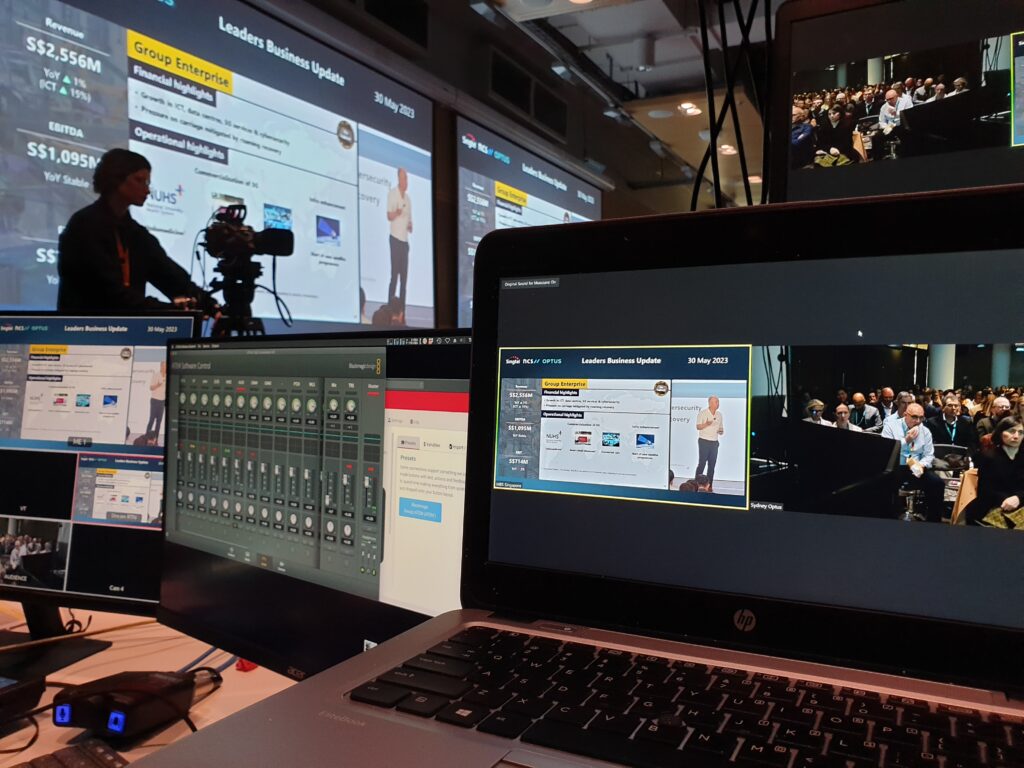
A Guide to Success
In recent years, virtual live-streaming events have become increasingly popular, offering an innovative way to connect with audiences across Australia and beyond. Whether you’re organising a conference, concert, webinar, or product launch, running a successful virtual event requires careful planning, technical proficiency, and a deep understanding of audience engagement. In this guide, we’ll walk you through the essential steps to create a captivating and seamless virtual live-streaming event in Australia.
Define Your Objectives and Target Audience:
Start by clearly defining your event’s objectives and identifying your target audience. Understand the purpose of your event – whether it’s for education, entertainment, networking, or marketing – and tailor your content and format accordingly. Define your target audience’s demographics, preferences, and needs to create an experience that resonates with them.
Choose the Right Virtual Event Platform:
Selecting the right virtual event platform is crucial for a successful live-streaming event. Consider platforms that offer features such as high-quality video streaming, interactive chat functionalities, virtual networking capabilities, and analytics to track engagement. Popular platforms in Australia include Zoom, Microsoft Teams, Webex, and Hopin. Evaluate each platform’s suitability based on your event’s requirements and select the one that aligns best with your objectives.
Plan and Prepare Engaging Content:
Develop a compelling agenda or program for your virtual event. Divide it into sessions or segments, keeping in mind the attention span of your audience. Include a mix of engaging presentations, panel discussions, Q & A sessions, and interactive activities to maintain interest throughout the event. Leverage multimedia elements like videos, slides, and live demos to enhance the visual appeal and deliver a dynamic experience.
Technical Setup and Testing:
Ensure that your technical setup is reliable and optimised for seamless live-streaming. Invest in high-quality video and audio equipment, including cameras, microphones, and lighting. Test your internet connection to ensure stability and sufficient bandwidth for smooth streaming. Conduct thorough rehearsals with speakers and presenters to familiarise them with the virtual platform and resolve any technical issues in advance.
Engage and Interact with Participants:
Virtual events thrive on audience engagement. Encourage active participation through interactive features such as live polls, Q & A sessions, and chat discussions. Assign moderators to monitor the chat and address questions and comments promptly. Consider incorporating gamification elements or virtual networking opportunities to foster connections and keep participants engaged throughout the event.
Promote and Market Your Event
Effective promotion is essential for driving attendance to your virtual live-streaming event. Leverage various marketing channels such as social media, email marketing, website announcements, and partnerships with relevant influences or industry associations. Create compelling promotional content that highlights the unique value and benefits of attending your event. Consider offering early bird discounts or exclusive perks to incentivise registrations.
Provide Post-Event Engagement
Extend the value of your virtual event beyond its live duration. Record the sessions and make them available for on-demand viewing post-event. Create a dedicated portal or webpage where attendees can access the recordings, slides, and additional resources. Encourage ongoing engagement by facilitating post-event discussions or networking opportunities through forums, social media groups, or follow-up webinars.
Running a successful virtual live-streaming event in Australia requires careful planning, technical proficiency, and a focus on audience engagement. By defining clear objective, selecting the right platform, preparing engaging content, and fostering interaction, you can create an immersive and memorable experience for your attendees. Embrace the power of technology to overcome geographical barriers and connect with a broader audience. With strategic promotion and post-event engagement, your virtual event can leave a lasting impact and pave the way for future successful endeavours.

Planning a Pharmaceutical event?
Pharmaceutical events play a vital role in bringing together professionals, researchers, and stakeholders from the industry to exchange knowledge, showcase innovations, and foster collaborations. Whether it’s a conference, symposium, or exhibition, organising a successful pharmaceutical event requires careful planning and execution. To help you create impactful experiences, we have compiled ten essential tips that will ensure your event stands out and leaves a lasting impression on attendees.
1. Define Clear Objectives: Before diving into event planning, establish clear objectives for your pharmaceutical event. Are you aiming to educate attendees, promote a new product, or foster networking opportunities? Defining your goals will guide your decision making process throughout the event planning journey. CT event crew have decades of experience working with clients sharing valuable information & guidance at the crucial early stages of defining your event objectives.
2. Understand Your Audience: Knowing your target audience is crucial for tailoring your event to their specific needs and interests. Conduct market research to gain insights into their preferences, challenges, and expectations. This will enable you to curate relevant content and attract the right participants, leading to a more engaged and satisfied audience.
3. Choose the Right Venue: Selecting the appropriate venue sets the tone for your event. Consider factors such as capacity, location, accessibility, , and available facilities. Ensure that the venue aligns with the image you want to portray and can accomodate your events activities comfortably. We have worked on hundreds of different types of events in a plethora of locations and facilities & can offer our clients this knowledge & experience readily.
4. Engaging Content: Crafting compelling content is vital to keep attendees engaged throughout your event. Arrange a diverse range of presentations, workshops, panel discussions, and interactive sessions to cater to different learning styles. Inviting renowned speakers and subject matter experts will add credibility and value to your event. Creating content that is captivating, engaging, & consistent is an art form that our creators excel in, transforming an average event into unforgettable, amazing experiences that take your delegates collective breath away.
5. Utilise Technology: Incorporating technology into your pharmaceutical event can enhance the attendee experience and streamline operations. Leverage event management software for seamless registration, ticketing and communication. Consider utilising event apps to provide real-time updates, personalised agendas, and networking opportunities.
6. Networking Opportunities: Facilitating networking is one of the primary reasons attendees participate in pharmaceutical events. Provide dedicated spaces for networking activities like speed networking sessions, roundtable discussions, social events to encourage meaningful connections among participants.
7. Sponsorship and Exhibitor Opportunities: Collaborating with sponsors and exhibitors can enhance the overall experience for attendees while providing valuable exposure for industry partners. Create attractive sponsorship packages and exhibition spaces that align with your events theme and offer tangible benefits for sponsors, such as branding opportunities and access to attendee database.
8. Marketing and Promotion: Effective marketing and promotion are crucial to drive attendance and generate excitement. Utilise various channels, such as social media, email marketing, industry publications, and partnerships with relevant organisations. Highlight the unique selling points of your event to create a compelling value proposition for potential attendees.
9. Seamless Logistics: Smooth logistics are quintessential to Pharma events. Pay attention to details such as registration process, on-site signage, audiovisual equipment , and transportation arrangements. Ensure that everything is well organised and communicated to attendees in advance to minimise any inconvenience. Technical production is our core discipline and what CT Events Australia is renowned for, from designing and creating a set & stage to building the tech around it to make it come to life. CT Events has the “right stuff”, the right equipment and the right crew to ensure seamless production.
10. Post Event Evaluation & Follow-up: Once the event concludes, evaluate its success by gathering feedback from attendees, sponsors and exhibitors. Analyse the data to identify areas of improvement for future events. Additionally, follow up with attendees through post-event surveys, newsletters, or social media to maintain engagement and nurture relationships.
Organising a successful pharmaceutical event requires careful planning, attention to detail, and a focus on creating impactful experiences. These simple ten tips are the basic fundamentals to not only meeting your events objectives but will also leave an indelible imprint on the memories of your delegates, fostering long term relationships and driving positive change in the pharmaceutical industry.
Planning is a crucial component to Pharma event planning, the best way to get the most return on investment. Whether you want to boost approval for your newest drugs or train your team, these fundamentals will help you reach your goals. Ct Events Australia know what is needed. The specialist event producers with an experienced hands on team of tech experts offering exceptional service and support in; technical production, content creation, event direction, customised set & stage requirements, through to video production and live streaming capabilities.



Event Planning Check list - The best must-have comprehensive guide for event planning success.
At CT Events, the constant demand for event planning assistance is inherent to our role in this industry. This comprehensive guide is our endeavour to impart the insights and strategies we have accumulated throughout years of orchestrating, overseeing, and contributing to events ranging in scale from intimate gatherings of 50 people to colossal assemblies of 100,000 attendees. Our primary intention in crafting this guide was to provide you with a valuable resource.
In creating this guide, our sole aim is to equip you with extensive insights, enabling a more proficient and streamlined guide to event planning. However, it dawned on us that delving deeply into each of these pointers could easily lead to a series of dedicated blog posts! Instead, our objective was to offer a more succinct yet impactful compilation, providing a laughing pad for your event planning endeavours, rather than an exhaustive encyclopaedia version!
Whether this marks your inaugural venture into event planning or your 400th, we aspire fro you to discover substantial value within these tips, insider techniques, and cost saving measures shared throughout the checklist. Simplifying your life is our ultimate aspiration both in this blog and at your event!
Should you decide that you would like to share the CT Events Australia experience then much of the below you will find us there with you every step of the way, offering face to face guidance, support to achieve and produce a seamless enjoyable event experience.
So let’s get started with the plenary stages…
Define the Essence of your event – As highlighted by world famous author & TED Talk speaker, Simon Sinek, commencing with the “Why” is crucial to anything in life. Establish the purpose behind your event. What drives it, and what compelling reasons will entice attendees to participate? (https://simonsinek.com/books/start-with-why/)
Key Objectives (3-5) – Once your “Why” has been defined and established move on to choosing what are the core achievements you aim to attain through your event. Clearly outline these pivotal goals and communicate them across your entire team. To maintain focus, consider displaying them prominently, perhaps on a bulletin board, as a constant reminder. You may even leave a pile of “sticky notes” and pen by the board encouraging your team to “stick an idea or to do” as they pass it daily. Quite often inspiration or clarifying moments happen on the fly, jot them down and pop them on the board. Then as the planning stage progresses the “sticky note” ideas are expanded on, maybe incorporated or discarded.
Envision ambitious concepts – Let your imagination soar! During the planning phase, the realm of possibilities is wide open, so go for it. Guide yourself through the grand occasion, jotting down every single idea that comes to mind. Keep in mind that while not all of these may materialise at the actual event, some might just surprise you!
Seasoned event organisers often stress that the finest concepts are borrowed, highlighting the opportunity to learn from peers’ missteps. Delve into your event concept and survey the existing landscape. Did certain events draw substantial crowds? Is there a standout activity you can re-imagine? Take note of their chosen dates and scour reviews for insights that can help you sidestep potential pitfalls.
Define your audience – (age, preferences, aversions, etc.) – Swiftly pinpointing your desired attendees is integral, as their routines can influence the events timing and scheduling. The better you can clarify your target demographic, the more tailored you can make the event to suit their preferences. So for example does your demographic consist of parents , whose sole availability might be dictated by parenting commitments? Are they young professionals who might prefer a conference from Thursday through Saturday instead of Friday through Sunday? If uncertainty prevails don’t hesitate to conduct a survey amongst your target audience to determine the optimal day/s and time.
Alternate Date/Time Options A, B, & C – Prepare several potential event dates and times in the early planning stages. Ensuring you have back up plans is vital in case resources don’t align as initially anticipated.
Budget tip – Weekday bookings offer cost savings, although your target audience’s attending might be affected.Consider both factors when deciding on the events total duration. Regrettably, time equates to expenses.
Consider scheduling conflicts – Steer clear of overlapping with other concurrent events on your chosen day. Your city’s event calendar is a valuable tool for this purpose, encompassing all significant events. For example sporting matches close by, shows or concerts held at the same venue or close by.
Incorporate weather considerations – Weather’s unpredictability should be factored into your date selection process. Refer to Weather tracking apps and monitor forecasts. Above all, ensure you have a contingency weather plan in place, even of your event is indoors. This guards against scenarios like power outages, rain or strong winds that could potentially lead to unsafe conditions.
Finalise the date – After taking all factors into account, choose among your options for the main event day.
Develop Event Concept
Event theme – Every event requires a theme, whether it’s a classic Hollywood awards gala or a cutting edge tech conference. Our brains naturally engage with our surroundings through our senses. We often say an event must conceive experiences that invoke the senses to ouch the heart and spark the imagination! An event should seamlessly transport the attendees beyond the venue’s physical confines. Think about where you want to transport your audience to? What emotions do you aim to evoke. What actions do want to inspire o occur both during and post event.
Craft a Pinterest Vision Board – Crafting a vision board on Pinterest offers a splendid means to visually capture your aspirations, accessible for everyone to peruse. This resource proves invaluable when delegating tasks to collaborators and supplier’s, whether it’s collaborating with a graphic designer for invitations or coordinating with a production company like CT Events for the ideal audio visual arrangement.
Event Title – Your event’s name serves as a powerful marketing ally. It should pique curiosity, encouraging individuals to explore the event’s finer details of who, what, where, when and why. Avoid being too elusive, ensuring that the headline offers a glimpse of the event’s essence.
Anticipated attendance – Establish the projected number of attendees, factoring in the applicable regulations such as venues capacity limits. The more precise your estimate, the more effectively you can plan for aspects like catering, beverages, promotional materials, and other event elements. For catered events, thank about requesting RSVPS to ensure accurate food and beverage provisioning.
Develop Event Budget
Projected vs. Actual – When orchestrating an event, it is prudent to maintain dual budget structures: an estimated analysis of revenue versus expenses, and an actual account showcasing earnings versus expenditure. This practice remains important even if a predefined budget has been set, as it allows for the segregation of funds into expenditure categories. Aim for detailed precision, as the more your refine your cost breakdown, the more effective your budgeting and planning can be throughout the event’s progression. This is why here at CT Events we have absolute transparency with all costings of services, constant updates and frequent communication with our clients has allowed us to be known to respect and adhere to your budget requirements. So when working with suppliers do not hesitate to ask for costing beak downs the more clarity that you are given the more trust you can invest that your supplier is a support not a burden on your budget.
Revenue Sources – Enumerate all the avenues through which you anticipate generating income. This spectrum can encompass vendor booth fees, ticket sales, auctions, or merchandise transactions. Prioritise realism as it is always better to err on the side of exceeding the budget than falling short!
Expenditures – Presently, outline all conceivable costs that may arise. Encompass everything from rentals to even postage for invitations. It is advisable to allocate a buffer to your budget due to the tendency for expenses to exceed initial projections. You may even want to consider, should you be uncertain, doubling the estimated expense for a more comprehensive financial coverage.
Contingency Fund – allocate resources for the inevitable “Murphy’s Law” scenarios! Those unexpected hiccups that can and probably will arise! It is practically certain that last minute unforeseen expenses will emerge, so be proactive by setting aside a budge to address these occurrences.
Develop a Project Schedule – Avoiding the grave error of procrastination in event planning is vital. Postponed planning ranks among the primary causes for events missing their intended date. Dedicate male time to meticulously outline completion dates and enforce strict deadlines. Ensure that materials are sent to the printer at the earliest, allowing room for adjustments due to potential quality or quantity concerns.
Focus on Budget Management – Keep your budget current by revising it continuously, even during the initial planning phase when you’re acquiring rough estimates and quotes.
Make Your Parnterships
Explore Sponsorship Opportunities – A prudent approach to sponsorships involves forming strategic collaborations with individuals or entities that could mutually gain from your event. Exercise discretion and pursue sponsorships from those who share your event’s purpose. The essence of this exchange is that sponsors can invest in the event to either showcase or promote themselves ( monetary contributon) or offer products/services for promotional consideration. (in-kind donations)
Engage Vendors – Your vendors are essentially an extension of your team, so their selection should be as meticulous as with sponsorships. Their values ought to be aligned with yours. For instance, if your emphasis is on exceptional customer service, they should not only share this principle but also demonstrate it in action. Present your event concept and potential dates to them, elucidating why they are the ideal match for the occasion. Once you’ve chosen your vendors, tap into their expertise. Often, vendors can assist you in choosing the right venue, configuration, and entertainment, effectively reducing your workload.
To initiate this process, ask yourself if you require assistance with:
- Ticket sales & registration
- Event management
- Audiovisual
- Decor (tables, chairs, linens, etc..)
- Food & Beverage
- Parking
- Security
- Public relations & Marketing
- Transportation
- Printing & graphic design
- Media (Photography & Videography)
- Government permits and extra resources (ie. police, street closures…etc.)
- Power (generator, light towers, recycling…etc.)
- Ecology (porter-potties, trash, recycling…etc.)
Contact Entertainment Options – events typically necessitate some form of entertainment, whether it involves speakers, musicians, emcees, or DJs. Initiate discussions with potential talent early on to ensure your event gains their attention and to gauge their availability. Be mindful that sought after dates or last-minute requests might incur higher costs. Begin by requesting talent fees and obtaining quotes, treating this process like any other vendor selection. Booking entertainment that aligns with our event’s purpose is of course ideal, and this alignment might even lead to cost reductions. When you’re prepared to secure your entertainment, consider the following points :
- Seek Technical Riders – Forward these to your technical production company to obtain preliminary cost estimate. Exercise caution, as at times these technical requirements can exceed the actual talent fee in terms of cost.
- Obtain Hospitality Riders – They often include a unique item, like green M&M’s . They anticipate these requests to be flippant enough that you would question them. While many items are open to negotiation, it’s recommended to be accommodating.
- Travel arrangements – Factor potential travel and accomodation expenses for the talent(Usually subject to negotiation)
- Comprehensive Budget Calculation – Sum up all components to determine the actual expenses (talent fee, technical rider expenses, travel and lodging costs, and hospitality rider costs.)
- Permit acquisition – If required (e.g. for alcohol services), ensure the necessary permits are secured.
Full Budget Reevaluation – Estimate the overall costs and income derived from your partnerships, and then update your budget. Remember, you might need to revisit your plans and explore new approaches. Don’t be disheartened if this happens; it is an opportunity for innovative solutions.
It is in this realm that the experience our clients have with CT Events sets us apart. We are renowned for a cool headed creative, solution orientated attitude. At times of crisis this is invaluable and why so many of our clients entrust us year after year, decade after decade with their most important events.
Venue wish list – Formulate a wish list of potential venues, ranked from highest preferences to lowest and incorporate suggestions for potential vendor collaborations. Initiate this process by reaching out to each venue, inquiring about availability on your preferred date and requesting pricing details. Simultaneously, as about any overarching regulations concerning external vendors. Discard venues that don’t align with your requirements and proceed to the subsequent stage with the ones that do.
Quick tip – Being able to use outside vendors will save you money.
Quick Tip 2 – If you already know what vendors you will have, bring them along especially your AV provider.
Utilise questions strategically – Site surveys serve as an excellent opportunity to address all inquiries. approach this with readiness by compiling a list of questions in advance, particularly focusing on any particulars your vendors may require. For instance, your audio-visual team might need information regarding power distribution, load-in/load-out accessibility, sound limitations, parking and various other specifics.
Multi-event venue considerations – Ensure to inquire about the potential presence of concurrent events. This scenario is frequent in convention centres, and it’s important to understand its implications for your event. Will it necessitate adjustments in vendor arrival schedules due to loading dock availability? Could there be a presence of a competitor company during the event?
Parking – The parking arrangement gets the initial tome for attendees, so ensure their convenience. Often underestimated, this can become problematic with limited spaces, pricing issues, and the challenge of locating the event venue. Explore possibilities such as installing directional signs or arranging for validated parking to enhance ease for both attendees and vendors.
Final checks -With all factors weighed, select the Venus that aligns best with your event requirements. During this process, ensure all your queries are addressed and there are no ambiguities. Thoroughly review the entire contracting attain a complete understanding before appending your signature.
Quick Tip – If you have already confirmed your vendors, especially your audiovisual provider, involve them in this process.
Deposit planning – Strategise your deposit payments to sidestep potential cash flow complications.
Announce the date – Now that you’ve established the who, what, where, when and why, it’s time to lock in the date and get the event on people’s schedules. This can be achieved through the traditional mail or email, both of which are effective methods. However, it is worth noting that attendees tend to respond quicker to online RSVPs. Even including a pre-stamped envelope doesn’t always guarantee swift replies.
Initiate ticket sales – If your event requires admission, commence ticket sales promptly. Various methods are available, with email marketing (facilitating RSVPs/payment through designated emails) or a custom-made website being the most common.
Promote – If marketing isn’t your forte, consider tapping into your current vendor network to aid in spreading the word. Marketing trends evolve rapidly, catering to different demographics, making it challenging to stay current in advertising your event. Common strategies include social media, email campaigns, and guerrilla marketing. This not only exposes your event to the public but also alerts other event planners to plan around it. Garnering media attention via press releases remains effective, and remember to tie a noteworthy cause to your event, making it conversation-worthy.
Confirm attendees – Designate someone responsible for managing RSVP’s nd confirming attendee presence.
Begin your timeline
Initiate event timeline – Compose a comprehensive timeline, encompassing every imaginable detail, ranging from Susie picking up balloons to the scheduled performance by the entertainment. Begin from the initiation of your first event related tasks. If these tasks commence three days before the event, such as crafting centrepieces or assembling VIP bags with swag, include them on the timeline.
Allocate responsibilities – For each task, create a column to outline the task’s requirements or general notes. Additionally, schedule the individuals responsible for each task, providing their contact details for seamless communication and contingency planning.
Develop a layout diagram – Transform your layout into a visual layout. Draw the venue space and the planned arrangements to scale as accurately as possible. Many vendors can assist this process, and your venue contact might even supply you with a layout diagram.
Maintain updates – As you progress through the process of contracting talent and vendors, your timeline will evolve and become more defined. keep it current and pay careful attention to it, as this framework will aid in averting double bookings, load in conflicts, and addressing the vendor needs promptly as they arise.
Book talent
Contractual agreements – Execute the riders and contracts with the desired talent.
Merchandising agreements – Discuss buy-outs for merchandise and determine revenue sharing percentages.
Vendor and Talent contracts – It’s crucial for all vendors and entertainment to enter into a binding agreement. this mitigates the risk of no-shows and unforeseen circumstances. In your agreement, delineate your standards, encompassing everything from their event advertising scope to their attire.
Travel arrangements – If you are bringing in talent from out of town, secure their flights and accomodations now to reduce costs.
Marketing collaboration – Provide them with your marketing information. If your event is public, this enables them to promote themselves at your event, thereby expanding your event’s reach.
Book Vendors
Vendor Coordination – Ensure minimal conflicts among vendors by designating parking areas for all vendors and specifying their load in and load out locations. Create a well structured schedule for their loading operations.
Decor – Facilitate communication between your decor vendor, venue, and other vendors. Request a layout indicating the placement of all items and share it with your event team. Encourage the provision of drawings and CAD designs, when available, for AV and other vendors to align their styles.
Catering – Your caterer will require final quest numbers by a certain point. Allow a buffer and order slightly more than planned, while keeping it reasonable. Avoid excessive food ordering due to potential no-shows.
Inquire if the caterer permits leftovers to be taken home in to-go boxes. Clarify the protocol for underestimating quest counts and identify available alternative food choices on the event day. Consider all possible dietary restrictions., Gluten free and vegan dishes are highly requested.
Media (Photography and Videography) –
Furnish the schedule to your media crew to ensure they are present at the appropriate times. Issue on-site media personnel with credentials to avert any security concerns. Establish a connection between the video team and AV team for seamless assistance. If you expect press attendance , offer them a concise event overview (press kit)
Book Audiovisual – As an event production company, CT Events is here to provide you with some exclusive insights to streamline your AV planning process! Visit our website regularly for our webinars & blogs on topics such as “How to prevent AV mishaps” and “A guide for selecting the right event AV provider for your event”.
Your AV provider is integral in the seamless flow of your event so choose wisely! Ensure the team you choose is agile, communicative and seasoned nothing is more valuable than professionals who are experienced in this field. Open communication and reliable problem solvers is what a great AV team consists of!
Integration with Event elements.
Establish connections between your AV team, venue, entertainment and decor. Share any talent riders and contractual agreements to ensure seamless coordination.
Technical knowledge enhancements.
Familiarise yourself with the terms using resources like Google, as knowledge empowers effective communication with your AV company. For further assistance visit our website for our downloadable production guide infographic.
Quote examination and agreement – request a step-by-step explanation of the quote, delving into each line. ensure comprehensive coverage of all details before signing the quote(s)
Advanced planning for large events – For sizeable events, inquire about obtaining a CAD drawing for meticulous planning and visualisation.
Power and on-site support – Determine the power requirements from the AV team. Request connection with the on-site event rep from the AV company. Having a dedicated liaison other than the tech staff, who oversees lighting and sound but is affiliated with the AV firm is crucial. This individual will be readily available when needed. To delve deeper, explore our blog on “The significance of an Event manager”
Financial clarity – Clarity meal and overtime policies to evade unforeseen expenses.
Begin ordering the mix.
Promotional materials – With your vendors secured and a clearer picture of attendance emerging, it’s time to consider procuring any necessary promotional items. When contemplating the inclusion of promotional materials, bear in mind that larger orders often result in reduced costs.
Signage arrangements – Initiate the process of obtaining any required event signage. This could encompass signage parking, vendors booths or event programs.
Printing preparation – Forward the final designs to the printer and ensure their completion. Have you also prepared event feedback cards for vendors, volunteers, and attendees?
Staff apparel – If needed, place an order for staff t-shirts. Remember to order extra in each size as a precaution!
Main Marketing
Leverage existing resources – tap into the wealth of articles on various marketing tactics, both online and offline. Research and identify what strategies have been successful in the past.
Generate excitement and buzz – Commence showcasing the offerings of your event to ignite anticipation. Utilise social media and your website as prime platforms for this purpose.
Engage influencers –
Identify influencers within your target market and collaborate on blog posts or guest articles to gain exposure.
Media outreach – Reach out to media outlets to attend and cover your event. prepare a press release to share with the media unable to attend. Propose pre-event articles to be written. For events tied to a community cause media coverage is usually eager.
Social media amplification – Encourage attendees to actively use social media, particularly during multi-day events. Each attendee effectively becomes an advocate, amplifying the event’s reach.
Two to four weeks out.
Confirming arrangements – Reach out to vendors and entertainment to verify their arrival times and address any last minute inquiries, concerns, or additional requirements like extra set up tables. This confirmation is essential to counter potential no-shows, which can be common among vendors.
Prepare event essentials – Set up designated box(es) for collecting items necessary for the event. Include miscellaneous supplies like pens, clipboards, paper, quotes, badges, spare equipment, business cards, scissors, tape, etc… Consider labelling items you want to keep track of with a label maker.
Financial checks – Ensure all pre-event expenses are settled. Revisit your budget to confirm its stability on the event day. Are you on a tight budget or can you focus on boosting sales during the event? You might need to intensify ticket sales though world of mouth or social media during the final four weeks leading to the event.
Organise a central hub – Allocate a dedicated space for your team. This hub should store all the necessary materials and serve as a retreat for your team to relax or grab a quick meal.
Distribute information – Provide your team with comprehensive information. Supply diagrams of the event setup, the event schedule with contacts, social media guidelines, and pertinent vendors details.
Uniform guidelines – Clearly communicate the expected dress code for your entire event team. eliminating ambiguity streamlines the preparation process.
Communication strategy – Set up a communication protocol (e.g., walkie-talkies with surveillance earpieces, communication systems, texting, calling). using a dedicated communication system is advisable over relying dopey on cell phones due to their potential inefficiency. Investigate wireless communication systems, which can be provided by your AV company, or consider walkie-talkie setups for larger events.
Day of
Embrace the moment – Today is the day you’ve been waiting for! Take a moment to reflect on your journey and feel a sense of pride in all you’ve achieved so far.
Prioritise comfortable footwear – Given that you’ll be on your feet the entire time, opting for comfortable shoes is a must.
Media coordination – If media coverage is in your plan, designating a media contact to guide them through the event is a smart move.
Clarity with partners – Designate a representative for each partner so that roles and contracts are clear, ensuring efficient communication.
Get acquainted with your team – Take the time to meet everyone on your team, from AV technicians to the florists to servers. Establishing a personal connection humanises you, making troubleshooting more effective and less confrontational.
Remember to take breaks – Even when you are in the zone, remember to take breaks and nourish yourself.
Regular communication – Keep an open line of communication with your partners. Regular check-ins allow you to be proactive in addressing any concerns.
Social media management – Appoint a dedicated person to manage social media during the events. Make sure your event hashtag is prominently displayed for consistent use. Assign someone to capture the moments, tweet, and monitor social media. Utilise tools that enable posting across multiple platforms and monitoring hashtag activity. This task may come as a surprise, but it’s a full time job during the event.
Gather attendee Input – Consider enlisting agencies for paper or text surveys to collect feedback from attendees. Explore collaboration with you local universities special event class for survey assistance. You might also consider installing a permanent iPad for digital surveys, offering incentives to encourage participation.
Announce next years date – If you have the date confirmed, share it! This is a prime opportunity to generate excitement for the next edition and encourage current attendees to become future participants. “All partners” refers to the various collaborators, vendors, sponsors, and individuals in the event.
Follow up
Immediate – Distribute a post-event feedback survey to attendees, vendors, and volunteers. Note that if you’ve already collected feedback on site, this step can be skipped.
ASAP – Conduct a comprehensive debrief with your entire team. Share all gathered data and openly discuss the challenges and successes.
ASAP 2
Document all your insights for future reference. This will help subsequent staff members understand details of the previous year’s event.
ASAP 3 – Evaluate your event objectives. Determine whether you accomplished your goals, and if not document the reasons.
ASAP 4 – Analyse your budget in comparison to actual expenses incurred.
Review feedback – Once collected review feedback with your team and incorporate insights into your debrief.
Gratitude expressions – Immediately after the event, send thank-you cards to vendors, volunteers, media partners and attendees as a gesture of appreciation. Also a fabulous time to sow the seeds for next years event.
We did say it was a comprehensive guide!
With over 40 years experience we have watched many event planners and learnt so much. The most apparent fact is that there doesnt seem to be a comprehensive (thought of everything ) guide around so here it is!
We would also love to share the event planning journey with you, so if you are looking for a partner you can rely on…here we are!
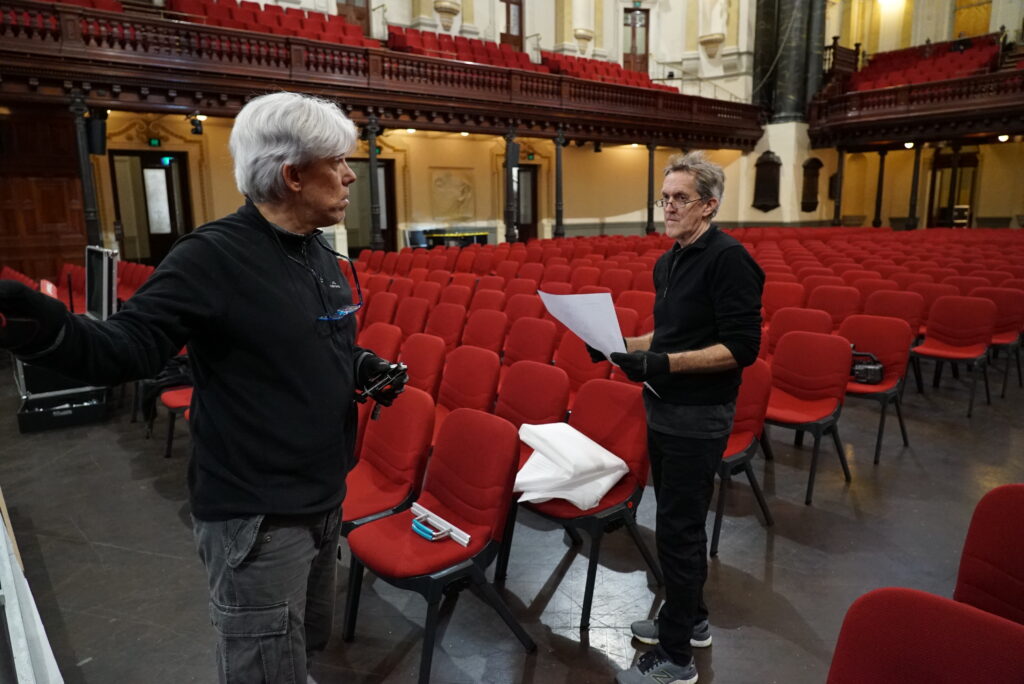

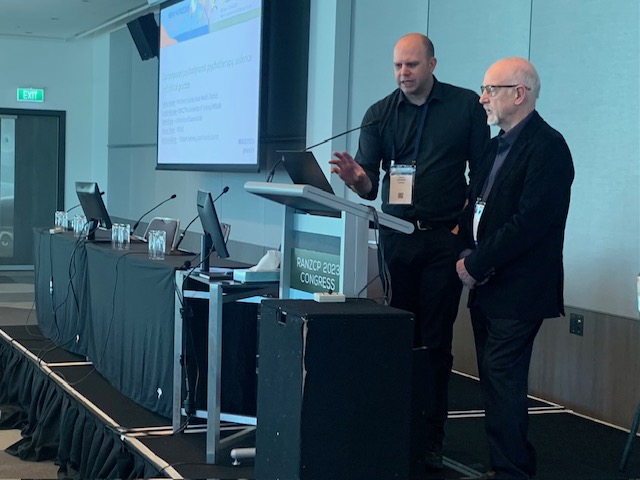
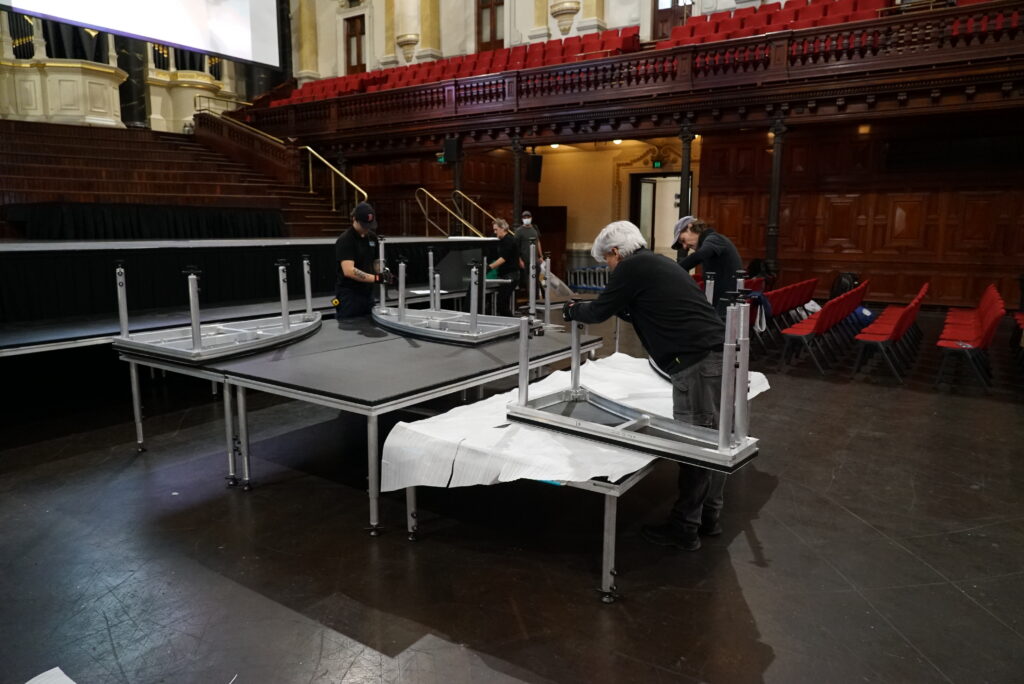

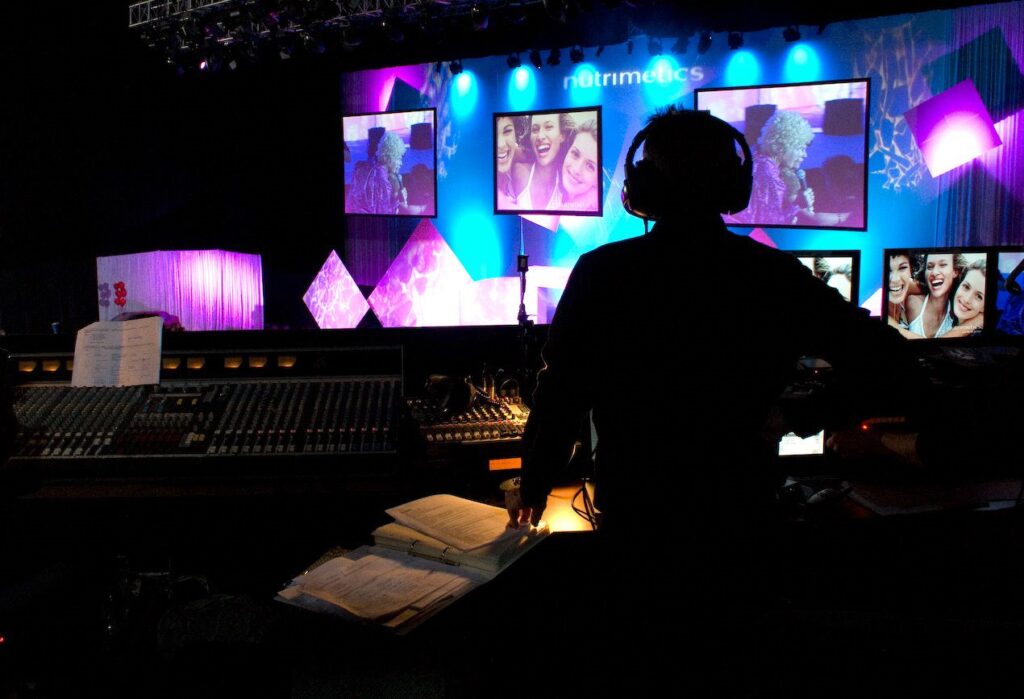

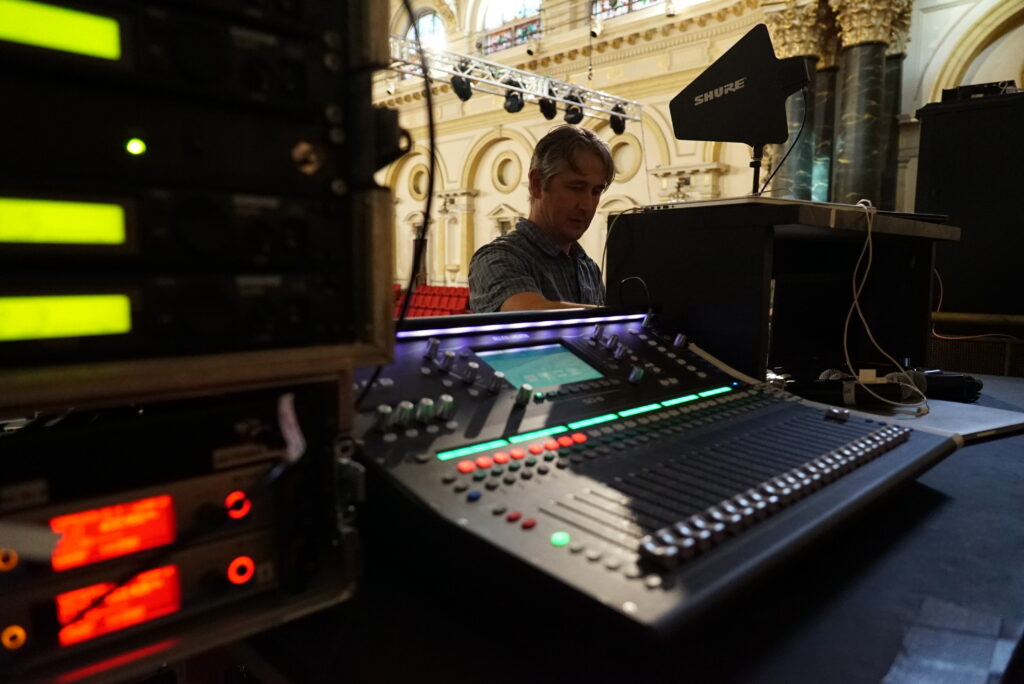


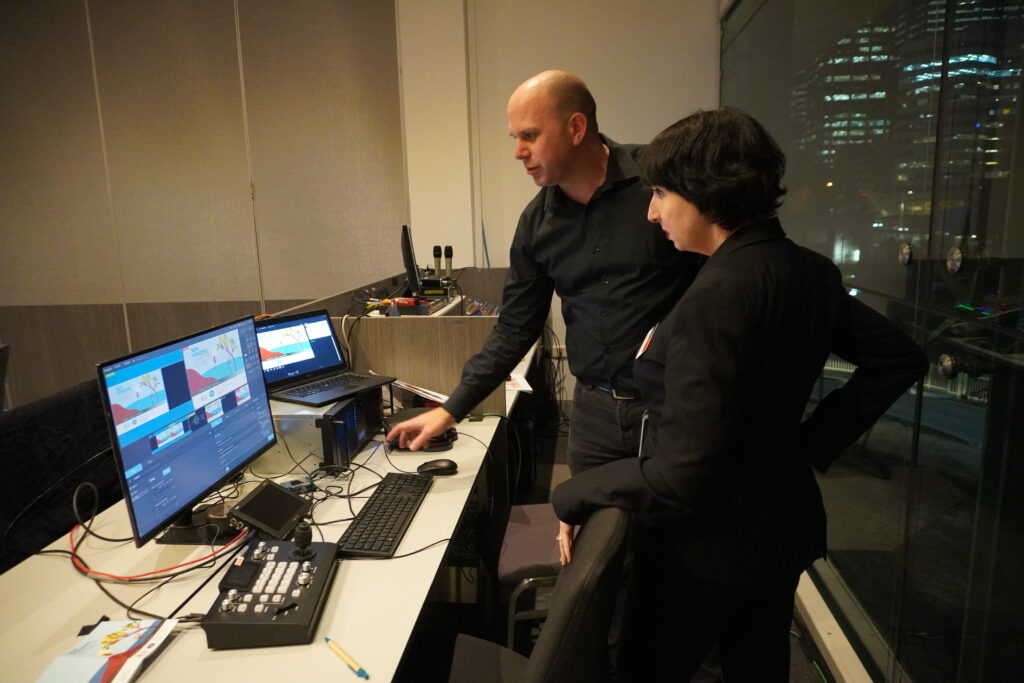
How to Prevent AV Mishaps at Your Next Corporate Event: A Guide to Choosing the Right AV Provider
Corporate events are essential for networking, building relationships, and conveying your company’s message. Whether it’s a conference, product launch, or an annual meeting, audio-visual (AV) components play a pivotal role in making these events successful. However, AV mishaps can quickly turn your carefully planned event into a disaster. To ensure that your next corporate event goes off without a hitch, it’s crucial to choose the right AV provider. In this guide, we’ll explore how to prevent AV mishaps by selecting the perfect AV partner.
- Define Your Event’s AV Needs
Before you start searching for an AV provider, it’s essential to clearly define your event’s AV requirements. Consider the following:
-
Venue size and layout: Different venues may require specific AV setups. Ensure your provider has experience working in similar spaces.
-
Audience size: The number of attendees will influence your AV needs, from microphones to projection size.
-
Event type: Is it a conference, seminar, gala, or product launch? Each event type has unique AV requirements.
-
Content: Identify the type of content you’ll be presenting (videos, presentations, live demos) and its technical requirements.
- Research Potential AV Providers
Now that you know your event’s AV needs, it’s time to start researching potential AV providers. Here’s how to go about it:
-
Ask for recommendations: Reach out to colleagues or industry peers who have organized successful corporate events. They can provide valuable insights and referrals.
-
Online research: Use search engines, social media, and industry-specific websites to find reputable AV providers in your area.
-
Read reviews and testimonials: Look for online reviews and testimonials from previous clients. This can give you an idea of the provider’s track record.
-
Check portfolios: Most AV providers have portfolios showcasing their past work. Review these to see if their style aligns with your event’s vision.
- Verify Experience and Expertise
Selecting an AV provider with the right experience and expertise is crucial. Consider the following:
-
Industry-specific experience: Look for providers who have experience working in your industry. They will be more familiar with your event’s specific requirements.
-
Technical proficiency: Ensure that the provider has the technical know-how to handle complex AV setups, including troubleshooting issues during the event.
-
References: Ask for references from previous clients, and reach out to them to gauge their satisfaction and any potential issues.
- Assess Equipment and Technology
The quality of AV equipment and technology can significantly impact your event’s success. Here’s what to consider:
-
State-of-the-art equipment: Verify that the AV provider uses the latest technology and equipment to ensure high-quality audio and visuals.
-
Backup systems: Inquire about their backup systems in case of technical failures, ensuring minimal disruptions to your event.
-
Compatibility: Confirm that the provider’s equipment is compatible with your content delivery methods (e.g., laptops, tablets, USB drives).
- Discuss Pricing and Contracts
Clearly understanding the costs and terms of the AV service is crucial to avoid unexpected expenses. Consider the following:
-
Detailed quotes: Request itemized quotes that outline all costs, including equipment rental, labor, and any additional fees.
-
Contracts: Carefully review the contract to ensure it includes all agreed-upon services, equipment specifications, and a contingency plan for AV failures.
-
Cancellation policy: Understand the provider’s cancellation policy and any associated penalties.
- Communication and Collaboration
Effective communication is key to preventing AV mishaps. Ensure that the AV provider is open to collaboration and understands your event’s goals and schedule:
-
Pre-event meetings: Schedule meetings with the provider to discuss your event’s timeline, requirements, and expectations.
-
Rehearsals: Conduct technical rehearsals to address any issues before the event day.
-
Emergency contact: Have a designated point of contact with the AV provider for real-time communication during the event.
Choosing the right AV provider for your corporate event is a crucial step in preventing AV mishaps and ensuring a successful gathering. By defining your AV needs, researching providers, assessing their experience and technology, discussing pricing and contracts, and fostering open communication, you can minimize the chances of technical glitches and deliver a seamless experience to your attendees. A well-executed AV plan will leave a positive impression and contribute to the overall success of your corporate event.
So why not contact us…because f you are looking for an AV team that are one of the best in the industry, especially in the field of corporate events, then we would love to share the CT Events experience with you!

